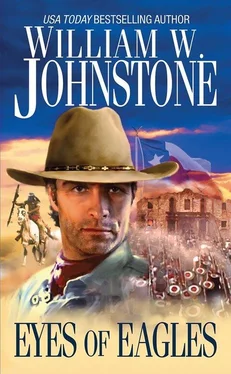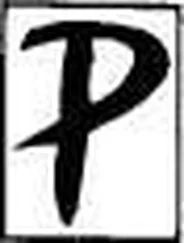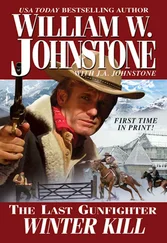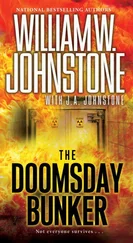Travis had ordered several men to stand watch outside the walls, and several men to keep the fires going inside the walls. Those men outside the walls were never heard from or seen by their comrades again; or by anyone else for that matter. Hand-picked men from the Mexican Army had crept forward in the darkness and sliced their throats.
Travis had grown increasingly restless. He had not taken his rifle, but a double-barreled shotgun, heavily loaded with rusty nails and whatever else the armorer could find, and mounted the parapet to stand by a cannon. He had consulted his timepiece before blowing out the candle in his room. It was four-thirty on the bitterly cold morning of March 6, 1836. Colonel William Barrett Travis had just about ninety minutes to live.
Miles away, Jamie Ian MacCallister slept the sleep of the utterly exhausted.
Jim Bowie stirred on his cot and suddenly became wide awake. “Sam?” he called.
“I’m right here by your side, sir.”
“Make sure those pistols are ready, Sam. All four of them, and put them by my side. Two to my right, two to my left.”
“Yes, sir, Mr. Jim. Is the Mexicans comin?’ ”
“They’re here. Unsheathe my blade, Sam.”
“Yes, sir. Now you be careful, Mr. Jim. That there blade is mighty sharp.”
Bowie chuckled in the darkness. “Careful? An old pirate like me? Pour us both a drink, Sam. And make them good ones, now, you hear.”
“You wants me to drink with you, sir?”
“That’s what I said, Sam.” He took the cup, brimming full of whiskey. “Thank you, Sam. Drink up. It’ll be your last time to drink with me before I meet the devil.”
Before Bowie’s startled eyes, Sam, a man that Bowie felt almost never touched a drop, emptied the cup, smacked his lips, and said, “Ahhh! Mighty fine drinkin’ whiskey, Mr. Jim. Mighty fine.”
Bowie had to laugh at Sam. “Is there any more in that jug, Sam?”
“Not narely a drop, sir.”
Bowie downed his cup. “Well, Sam, like the lady told me one time, years ago: Get off me, boy. You done got all you paid for.”
Sam and Jim Bowie shared a chuckle in the quiet darkness of predawn.
Jim said, “Now go over there in the far corner and sit down, Sam. When the soldiers bust through that door, you have your hands in the air just as high as you can stretch. Don’t make any attempt to help me. I want your promise on that.”
“I done served you for years, Jim Bowie. I can’t make no promise like...”
“Sam!”
“All right, Mr. Jim. You gots my promise.”
“I mean it, Sam.”
“I knows you do. I’ll do what you say.”
The time was twenty minutes until five.
Davy Crockett tossed his blankets from him and rose, stretching the cold kinks out of his muscles. He picked up Ol’ Betsy and climbed stiffly up to the parapet, to stand staring out into the darkness.
“She’s a quiet one, Davy,” one of his men said. “Too damn quiet.”
“Ol’ Santy Anny’s a-comin’ this mornin’. That’s why she’s so quiet. As soon as his bands start tootin’ on the bugles and beatin’ the drums, they’ll be hell to pay, all right. Get the boys up and ready.”
Four forty-five.
Crockett left the platform and began rousing the men. “She’s due to come any minute now, boys. I feel it in my bones.”
“You feel it, too, Davy?” Travis called from his post.
“I damn shore do, Billy-Boy,” Davy replied with a grin, knowing how Travis hated to be called that.
But Travis only laughed this time. “We’ll make them pay in blood, Davy.”
“Damn right, Colonel!” Crockett’s strong voice boomed across the cold and windswept plaza.
Ten minutes to five.
Bowie lay on his cot, the blankets pulled up to his neck, but his hands were free. He thought fondly of his dead wife and children. “Just let me see them once more, Lord,” he whispered. “And then you can send me to Hell. Just once more.”
“You ain’t goin’ to hell, Jim Bowie,” Sam whispered. “Ever’body knows God loves His warriors.”
If Bowie heard him, he made no comment.
Almeron Dickerson kissed his wife on the lips, held her close for a moment, and then ran to his artillery battery.
“Return to me, Almeron!” she called.
“If it’s God’s will, Susanna!” he called over his shoulder.
It was not to be.
Five minutes to five.
Santa Anna rode his horse slowly through the silent streets to the house where he planned on observing the battle. He dismounted and entered the warmth of the building, accepting a cup of coffee from an aide. The coffee had not been sweetened. Santa Anna haughtily ordered the aide to sweeten his coffee and not to make that same mistake again.
Then, in an uncharacteristic burst of charity, he apologized to the young aide. Santa Anna stood by an open window, sipping coffee and humming his favorite tune: the Degüello.
Forty-two
Remember the Alamo
Five o’clock. March 6, 1836
The heavy low notes of the Degüello sounded, and Travis yelled, “Here they come, boys! Here they come! To your posts, men. The enemy is about us.”
They sure were. Some three thousand of Santa Anna’s best combat troops surged up from the ground and charged the walls of the Alamo, all of them screaming loudly.
For just a very few seconds, the men of the Alamo were stunned by the enormity of it all. Then they rallied into action. Fifty Mexican soldiers were killed in the first volley of rifle fire from the walls.
“Give them what for, men!” Travis yelled, waving his sword with one hand and holding the double-barreled shotgun in the other.
And the volunteers at the Alamo did just that. Captain Dickerson ordered his cannon to be charged with grapeshot and fired nearly point-blank into the charging Mexican troops. It was carnage for the Mexican infantry.
Travis stood on the reinforced platform holding the battery of eight-pounders in the center of the north wall. He calmly brought his sword down on the cold metal of the cannon with a ringing slap and told the gunner, “Fire it, man. Do your duty. For God, Freedom, and Texas.”
The cannon roared and an entire line of Mexican troops was blown into eternity, the grapeshot shredding their bodies.
Crockett and his men were guarding the front gate, and guard it they did. They stood calmly on the walls, fully exposed, and fired volley after volley into the charging troops until the Mexican commanders wisely decided to shift troops away from that part of the battle.
The Mexican troops had suffered so many wounded during the first rush, their pain-filled shrieking and screaming and pitiful calling for help was clearly audible over the crack and boom of combat. Some Mexican troops were beginning to retreat — never had these seasoned combat veterans faced anything like the cold fury of the men defending the Alamo. The officers screamed and cursed at the men, beating them with the flat side of their swords, commanding them to turn around and once more charge into battle. Some did; most did not.
The Mexican commanders ordered their buglers to sound recall; the first charge had failed miserably. Santa Anna went into a screaming rage as the first notes of the bugles reached him. His senior advisors tried to reason with him. It was no use. General Santa Anna was like a wild man in his fury. How was it possible, he screamed, that two hundred men could successfully beat back a charge by three thousand men?
His advisors had no reply to that.
Santa Anna jerked a very startled and very frightened young runner to him, holding the young man by the front of his jacket, and said, “You take this message to General Cos. He has one more chance to breach those walls. Just one. Now fly like the devil is nipping at your heels!”
Читать дальше









